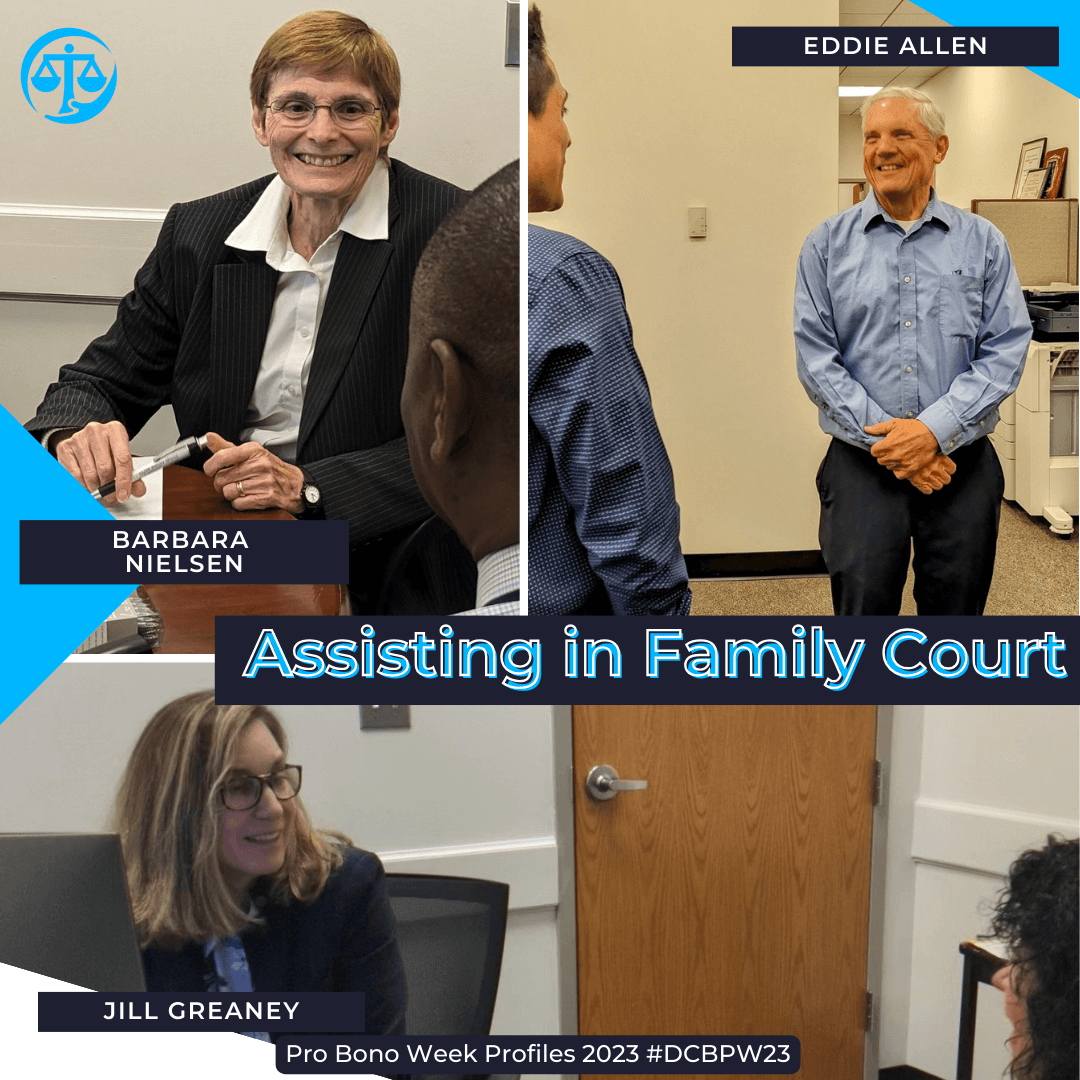
DC Pro Bono Week Profiles: Helping Unrepresented Litigants Navigate Family Court
Over 85% of parties in child custody, divorce, and child support cases in D.C. Superior Court lack representation. The Family Court Self-Help Center, on site at the Moultrie Courthouse, is a free resource for unrepresented litigants who must navigate a complex legal system designed for lawyers. The Self-Help Center provides customers with information about family law, helps prepare pleadings, instructs litigants how to file and serve documents, clarifies court processes, and offers referrals to community resources.
Family law is a world apart from the commercial litigation and environmental work that Jill Greaney had done prior to volunteering at the Self-Help Center. “I wasn’t sure whether it would be a good fit,” recalled Jill. “But I found that I really enjoyed sitting down with people and figuring out how I could assist them.”
Jill has been regularly volunteering at the Self-Help Center for 13 years. She figures she’s helped well over a thousand customers – each with their own unique story.
The Self-Help Center is staffed by court employees – an experienced family law attorney, three facilitators, and a deputy clerk. Volunteer lawyers play a vital role in helping the staff serve over 6,000 customers each year.
“The staff are extremely knowledgeable and are always available to answer questions,” said Barbara Nielsen who regularly volunteers at the Self-Help Center. “They are an excellent resource.” Barbara started volunteering over a decade ago. She had recently earned her law degree after retiring from a Foreign Service career – living and working in seven different countries across four continents. Now, she works at the State Department.
When asked what keeps her coming back to the Self-Help Center all these years, Barbara responded: “We provide a valuable service to people who do not have lawyers and need help. I think the customers leave feeling that we’ve been able to help them in a concrete way. That’s very satisfying.”
Volunteers sign up to staff one or more three-hour shifts at the Self-Help Center each month. Whether it’s work schedules, family responsibilities, or frequent travel, the predictable time commitment helps lawyers fit volunteering into their busy lives. When their shift is over, they don’t walk away with a client or a case.
Eddie Allen had limited exposure to family law in a career that took him from in-house counsel at a local hospital to Capitol Hill to a healthcare trade association. After completing a training session and shadowing the Self-Help Center staff, Eddie thought: “I can do this!” He’s been a regular volunteer for five years.
Some of the situations presented at the Self-Help Center leave a lasting impression. Both Eddie and Jill have helped grandparents petitioning for custody of their young grandchildren following the sudden death of their adult child. “I’m meeting with a person who is grieving the unexpected loss of their child and having to immediately step in to take care of their grandchild who has lost a parent, and I’m wondering – how are they getting through the day today?” said Jill.
“The stories can be tragic and heart-wrenching,” said Eddie. But he quickly added that “the volunteer experience is always satisfying. The customers I meet with regularly express their gratitude for my help.”
Volunteering at the Self-Help Center provides meaningful professional development opportunities, particularly for lawyers who are early in their careers. “You learn how to conduct an interview which is an important skill for lawyers,” said Barbara. “You have to listen carefully and guide the conversation to elicit the information you need.”
“People tell a story – they have a problem, or they want to achieve a certain outcome, but they don’t know how the legal system works,” said Jill. “As a volunteer, you learn how to explain laws and court procedures that are unfamiliar to the customer, and then work with them to distill the raw facts of their situation into a format they can submit to court. You respond to questions on the spot and work at a quick pace so the customer can walk out the door with what they need that day.”
Volunteers also bring their own experience and expertise when coming to the Self-Help Center. Barbara shared that she sometimes relies on her Foreign Service background when volunteering. She knows about passport requirements for children and certificates of birth for U.S. citizens born abroad. She also speaks French and Spanish. Having been stationed in Algeria and Senegal, Barbara describes it as “a moment of joy” when a customer from a francophone African country comes into the Self-Help Center, and she’s able to speak French with them.
Jill, Barbara, and Eddie all enjoy connecting with the Self-Help Center customers they meet with on a more personal level when they can. When Eddie recognizes the SE neighborhood where a customer lives, he’ll mention that he used to work as a lawyer at Greater Southeast Community Hospital. And sometimes the customer responds: “Really?! I was born there!”
******
We can always use more volunteers at the Family Court Self-Help Center! Lawyers can volunteer individually or through a law firm or corporate legal department project.
Interested? Please contact Jodi Feldman, Pro Bono Manager for the DC Courts, at Jodi.Feldman@dccsystem.gov, for more information.






